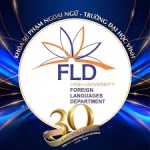Speaker
Description
One of the forms of language contact in today’s multilingual world is code-switching (CS) which has been widely studied in General English teaching and in English for Specific Purposes (ESP). This paper reports on a case study of CS in an emerging context of one way-immersion education in Vietnam through a Vietnamese teacher of Maths’ reflection and narration from sociolinguistic perspectives. The case reflective narrative study, following a descriptive research design, found that the teacher’s CS practice in her Maths classes was done for numerous reasons: (1) the discrepancies in the Maths curriculums in Vietnamese and in English, (2) the prioritized goals of teaching Maths, (3) the students’ limited knowledge of subject matter (e.g., Maths), (4) the institution’s support for CS (implicit or explicit) and (5) the teacher’s decision to personally sacrifice her own benefits (e.g., a strong desire to improve her English proficiency while teaching Maths by speaking English in class) for the students’ chances to comprehend the Maths lessons if CS is practiced in class. The paper proceeds with the discussion on the role of the mother tongue in one-way immersion education, the stakeholders’ attitudes towards CS in one-way immersion education in Vietnam and the myth about the relationships between teachers’ low English proficiency, lack of teaching experience and their resort to the CS practice in class.

